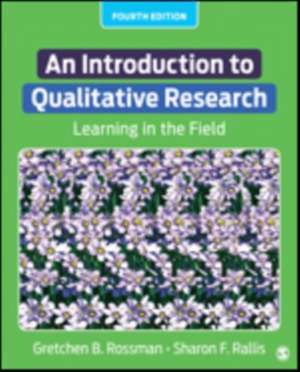An Introduction to Qualitative Research: Learning in the Field
Autor Gretchen B Rossman, Sharon F Rallisen Limba Engleză Paperback – 21 iun 2016
Preț: 518.74 lei
Preț vechi: 701.00 lei
-26% Nou
99.26€ • 103.91$ • 82.13£
Carte indisponibilă temporar
Specificații
ISBN-10: 1506307930
Pagini: 344
Dimensiuni: 187 x 232 x 23 mm
Greutate: 0.57 kg
Ediția:Fourth Edition
Editura: SAGE Publications
Colecția Sage Publications, Inc
Locul publicării:Thousand Oaks, United States
Recenzii
Rossman and Rallis build on their experience as researchers, teachers, and authors to update and improve what I think is simply the best available text for an introductory course on qualitative research methods.
Cuprins
Doing Qualitative Research: Tales of Three Characters
Defining Qualitative Research
Common Characteristics
Typical Purposes and Overall Approaches
The Characters' Choices
Ways of Using Research
Dispositions and Skills
Overview of the Book
Activities for Your Community of Practice
Further Reading
2. The Researcher as Learner
What is Learning?
The Reflexivity of Qualitative Research
Paradigms
Perspective in Practice
Dispositions and Skills
Activities for Your Community of Practice
Further Reading
3. The Researcher as Competent and Ethical
What Does Trustworthiness Matter?
What Makes a Trustworthy Study?
Systematic Practice
Ethical Practice
Dispositions and Skills
Activities for Your Community of Practice
Further Reading
4. Major Qualitative Research Genres
Choosing the Locus of Interest
Ethnographic Genres
Phenomenological Genres
Sociolinguist Genres
Case Studies
Dispositions and Skills
Activities for Your Community of Practice
Further Reading
5. Conceptualizing and Planning the Research
Practical Considerations
What is a Research Proposal?
Conceptual Framework
Design and Methods
Dispositions and Skills
Activities for Your Community of Practice
Further Reading
6. Entering the Field
Preparation
Intended Involvement
Approach and Negotiations
Expectations and Relationships
Dispositions and Skills
Activities for Your Community of Practice
Further Reading
7. Gathering Data in the Field
Decisions About Gathering Data
Systematic Inquiry
Generic In-Depth Interviewing
Specialized In-Depth Interviewing
Special Considerations
Observing People, Actions, and Events
Studying Material Culture
Dispositions and Skills
Activities for Your Community of Practice
Further Reading
8. Issues That Arise in the Field
How Do I Prepare to Gather Data?
How Can I Get Comfortable in the Field?
What are the Data?
How Do I Turn Sights, Sounds, and Objects Into Data?
Two Languages: Which Do I Use?
How Can I Change My Research Plan?
What Do I Reflect On?
How Do I Leave the Field?
Dispositions and Skills
Activities for Your Community of Practice
Further Reading
9. Our Character's Data
Anthony's Data
Marla's Data
Ruth's Data
Activities for Your Community of Practice
10. Analyzing and Interpreting Data
Analysis Happens
Generic Analysis
Writing In-Process Analytic Memos
Strategies for Analyzing Interview Data
Strategies for Analyzing Field Notes From Observations
Strategies for Analyzing Material Culture
Dispositions and Skills
Activities for Your Community of Practice
Further Reading
11. Our Characters' Analyses
Anthony's Analysis
Ruth's Analysis
Marla's Analysis
Dispositions and Skills
Activities for Your Community of Practice
12. Presenting the Learnings
Presentation
Voice
An Example
Organizing the Report
Using the Dispositions and Skills to Generate Useful Knowledge
Activities for Your Community of Practice
Further Reading
Notă biografică
Gretchen B. Rossman is Professor Emerita of International Education and the Center for International Education at the University of Massachusetts Amherst. She received her PhD in education from the University of Pennsylvania, with a specialization in higher-education administration. She has served as a visiting professor at Harvard University¿s Graduate School of Education. Prior to coming to the University of Massachusetts, she was senior research associate at Research for Better Schools in Philadelphia. With an international reputation as a qualitative methodologist, she has expertise in qualitative research design and methods, mixed-methods monitoring and evaluation, and inquiry in education. Over the past 30+ years, she has coauthored 15 books, 2 of which are editions of major qualitative research texts (Learning in the Field, third edition, with Sharon F. Rallis, and the present seventh edition of Designing Qualitative Research, with Catherine Marshall and Gerardo L. Blancöboth widely used guides for qualitative inquiry). In addition, she has published a book titled The Research Journey: An Introduction to Inquiry (with Sharon Rallis). She has also authored or coauthored more than 50 articles, book chapters, and technical reports focused on methodological issues in qualitative research synthesis, mixed-methods evaluation, and ethical research practice, as well as the analysis and evaluation of educational reform efforts both in the United States and internationally.
Professor Rossman has served as principal investigator (PI) or co-PI on several large U.S. Agency for International Development¿funded projects (in Palestine, the Southern Sudan, Malawi, Tanzania, and India); as co-PI on a World Bank¿funded multigrade schooling project (Senegal and Gambia); as lead trainer for a Save the Children¿funded participatory monitoring and evaluation of professional training (Azerbaijan); and as external evaluator on several domestic projects, including a Department of Education¿funded reform initiative, a National Science Foundation¿funded middle-grades science initiative, and a number of projects implementing more inclusive practices for students with disabilities.
